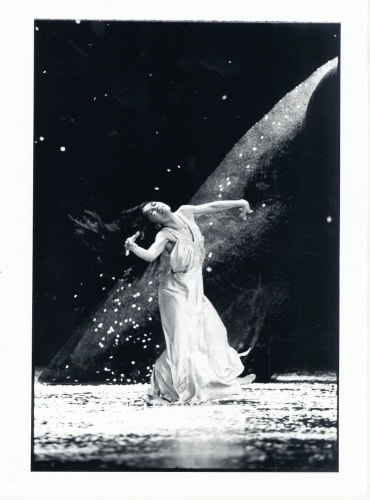West meets East and has great fun with cross-cultural pollination. Research is one thing, and Pina’s dancers did lots of research before they went to Japan Helena Pikon tells us, but research can never match the actuality on the ground. Fascination with the fabled Orient meets the shock of the immediate.
A respectful attempt to pull down the dividing screen from the inscrutable East, to strip back the polite smiling exterior, is brought to multifaceted life by a cornucopia of snapshots, some hackneyed, some amusing and captivating, within a flow of internalized dance solos.
Puzzle ‘postcards’ from 2004 spent in the Land of the Rising Sun speak of an overwhelming curiosity and delight in everything Japanese: food, nature (hot springs, flowers and herbs, birds and cherry blossom), technology (a recitation of well-known Japanese products), the ancient and the new, the gracious and the serene, Kabuki and Kimonos, Manga and Anime (hilarious Jedward hair and a martial arts duel sitting on chairs).
So many impressions to squeeze into 160 minutes… So much to grasp... Dominique Mercy conducts the front row in snoring soporific chorus, Nazareth Panadero shreds her black tulle gown, Helena Pikon covers her partner in a bearskin and imagines being naked in a forest. We are being spun a tale.
Ten Chi, Heaven and Earth, opens with Ditta Miranda Jasjfi moving like a Balinese temple dancer on a grey lunar landscape set—with a huge whale fluke (a tail fin which I gather some took for a giant mushroom), a whale’s back mound, and a dorsal fin rock—the black ocean in which the dancers swim.
Glowing golden orange, magenta, and silver, female fishes, immersed in Japan’s cultural waters, shimmer to samisen vibrations under Fernando Jacon’s ethereal lighting.
Sex, club hostesses, geishas, Dominique Mercy in Edith Sitwell drag (again), couples dancing in ballrooms to jazz and wind chime sounds, the erotic and the exotic take grip. The sensual bliss of foreign words rolled around on the tongue—samurai, bonsai, sushi—but self-awareness and self-mockery are not far away.
The collision of codes of conduct, the misunderstood signs, the minefield of manners is negotiated with humour. A girl carries an older man on her back, then he her. An allegory for co-operation? Or a still from an Ozu film?
And then the white blossom starts to fall, cascading like snow and falling stars. And it doesn’t stop till the end. Women sweep it up with their long black hair, as Peter Pabst’s subtle design evokes woodcuts that inspired many a Western painter.
Gentle parody is a Pina trope. We laugh at the courteous Japanese guide who tries to round up her, no doubt Western, recalcitrant tour group; at the lesson in bowing, proper posture, hands demurely in lap, the wide-eyed stabs at empathetic endeavour.
The different customs, rituals and traditions inevitably cause hysterics, yet the signature solos that end Ten Chi, seemingly improvisatory in style, reveal little, Zen like the East…
Fernando Suels Mendoza in a long full skirt does a dervish spin, Julie Shanahan proposes to stand barefoot on a block of ice, but is upstaged by Thusnelda Mercy walking barefoot on broken glass, Aida Vainieri drags Mendoza across a cloth-covered table to kiss him…
Focus is multiple: rolling dreamscapes and the fantastic Mechthild Grossman (many costume changes) reciting context-free texts from Bertolt Brecht, Georg Büchner, José Saramago, Ruth Berlau, Margarete Steffin and Wislawa Szymborska in a sonorous contralto. “I would like to wander and molest the sons of men”; ‘I go down with you into the waters”; “The moment is important”; “Do you know what goes well with champagne? Me.” What is that all about? Random as life…
The fourth piece in this non-chronological World Cities series by Pina Bausch, co-produced with Saitama Prefecture, Saitama Arts Foundation and Nippon Cultural Centre, Ten Chi doesn’t take itself too seriously. A gesture of goodwill, a hand across the seas, and a valuable learning curve, but what is the significance of the snakes, why does a woman count the fingers on the hands of the men in the front row? Back to Freud?..





